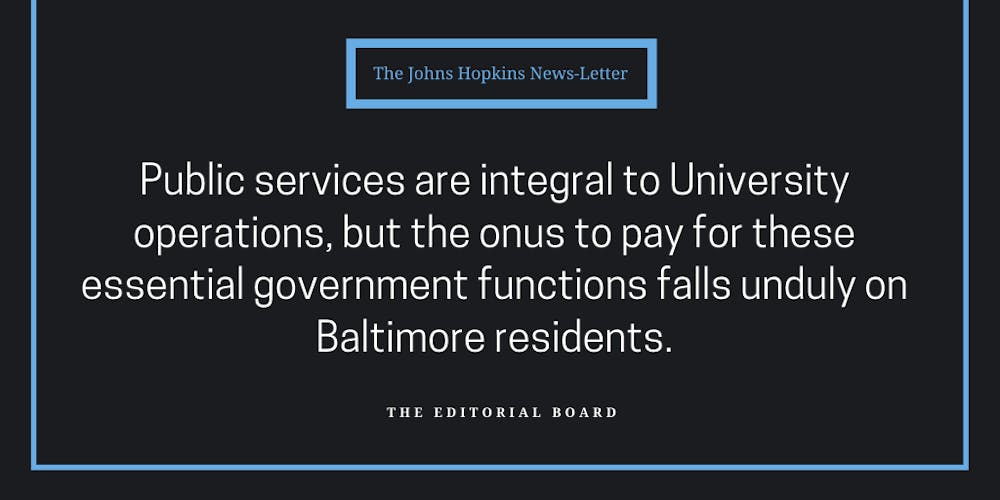This week, the New York Times reported that President Donald Trump had paid only $750 in federal income taxes in 2016 and 2017. The report further shows that Trump did not pay federal income taxes at all for 10 out of 15 years since 2000. In Tuesday’s presidential debate, Trump called the story fake news, claiming that he had actually paid “millions of dollars” in taxes.
The report comes after years of Trump dodging the public’s desire to see his tax returns. It is not required for candidates to release their tax returns, but in modern years, it is expected.
Someone who is running for president should be open and transparent with the American people. We depend on our leaders to respect the government services that they are running to protect.
While the President’s tax returns are not publicly available, the University’s are. Like Trump, Hopkins is not paying as much in taxes as it should be. In this case, however, the University is largely off the hook for taxes due to its nonprofit status.
The U.S. government classifies most colleges and universities as nonprofits because of their “educational purposes,” exempting them from federal income taxes. They are also often exempted from state and local income and property tax (though they do pay a few other taxes, like employee payroll).
At first glance, it makes sense that institutions of higher education are nonprofits. We recognize that universities serve a critical role in our society, and should be supported. But, like Trump, they have found ways to unethically benefit from the tax code. In the President’s own words, “Like every other private person, unless they’re stupid, they go through the laws and that’s what it is.”
The University is not using its tax-exempt status solely to support teaching and research, but also to increase the value of its endowment and the wealth of its donors. Because Hopkins is a nonprofit institution, donations to the University are tax-deductible. While this deduction is reasonable for many donors, larger gifts include special conditions that can generate income — and limit or even eliminate tax liabilities — for these very wealthy donors.
The minimum donation to receive these benefits is $100,000, or $250,000 if in the form of real estate. Who can afford to make that type of donation? People and corporations who don’t need more tax cuts.
Deductions for donations to nonprofits are justified as an incentive for charitable giving. We support the intent behind this policy, but nonprofits shouldn’t serve as investment opportunities for wealthy Americans.
Tax revenue from Hopkins is unlikely to significantly affect the federal government’s budget. But the loss of this revenue is tremendous on a local scale. Almost a third of the assessed property value of Baltimore City is tax-exempt, and a significant portion of this property is owned by Hopkins.
Since 2016, 14 nonprofit institutions have had agreements with the City of Baltimore to make donations in lieu of paying property taxes. As then-Mayor Stephanie Rawlings-Blake explained, “This multi-million dollar agreement demonstrates the commitment these institutions have to Baltimore and underscore the importance they play in economic development and job growth.”
If Hopkins Hospital and Bayview Medical Center alone were not exempt, they would contribute $38.9 million combined annually in city taxes; under the current agreement, they pay only about 3.6% of this.
In December, local activists and leaders, including State Senator Mary Washington, called on the city to abandon these agreements and require so-called “anchor institutions” like Hopkins to pay property taxes. Under the current agreement, those 14 institutions pay $6 million annually; taxation would result in $120 million in revenue for Baltimore.
Of course, Hopkins Hospital is a leading medical research institution and nonprofit hospital, and receives millions of dollars from the state of Maryland every year to provide free or reduced-cost care to low and moderate-income patients. However, according to National Nurses United, Hopkins has made it difficult for patients to access charity care.
Is Hopkins doing its job as an anchor institution? If patients can’t access health care, and are sometimes sued if unable to pay medical bills, is Hopkins really providing charitable services?
Fortunately, Hopkins has made an effort to invest in Baltimore. The HopkinsLocal campaign, launched in 2015, aims to hire and create economic opportunities for local residents. Additionally, a recent progress report indicated that Hopkins increased spending in local businesses by $54.3 million and hired 402 formerly incarcerated individuals between 2016 and 2019.
Thankfully, these efforts will continue; earlier this year, Hopkins outlined an updated list of goals through fiscal year 2022. For example, Hopkins pledges to increase spending in local businesses by $25 million, and will also add three ZIP codes to the list of neighborhoods where the University and Health System will focus hiring efforts.
Just yesterday, the University also announced it will devote $6 million over four years “to support innovative, community-led programs designed to curb violence.” While we appreciate that Hopkins is pursuing crime prevention models other than policing, it has yet to abandon its plans for a private police force.
Students, faculty and community members alike overwhelmingly oppose the creation of the Johns Hopkins Police Department. However, wealthy donors like Michael Bloomberg are in support. Due to their financial contributions, these individuals have disproportionate sway with the administration. And it is this administration that determines how Hopkins will spend its charitable donations.
The University’s investments in Baltimore are valuable, and we are thankful that University leaders understand their role in the community. However, they are voluntary contributions. Why must our neighborhoods and cities depend on an institution’s good will and token gestures to determine funding for public schools? Tax revenue, on the other hand, is allocated by elected officials to public services. It is not subject to the whims of administrators and trustees.
Lawmakers are currently pushing ahead with the local Kirwan Commission’s education plan, making it clear why Hopkins should be paying local taxes. If the plan is adopted by the state, Baltimore would nearly double its spending on public education; by 2030, the city would need to find roughly $330 million more per year in funding for the school district. If Hopkins paid local taxes, the city’s financial burden would be significantly alleviated. As State Senator Paul Pinsky said the other day, “We may need to consider some revenue from those who can better afford it.”
The University’s interests shouldn’t be prioritized over those of its city. Public services are integral to University operations, but the onus to pay for these essential government functions falls unduly on Baltimore residents.
Unlike our President, Hopkins has chosen to give back to its community. However, what we give back is simply not enough. Both our University and Trump have a duty to pay their fair share. Baltimore and the rest of the country deserve it.





